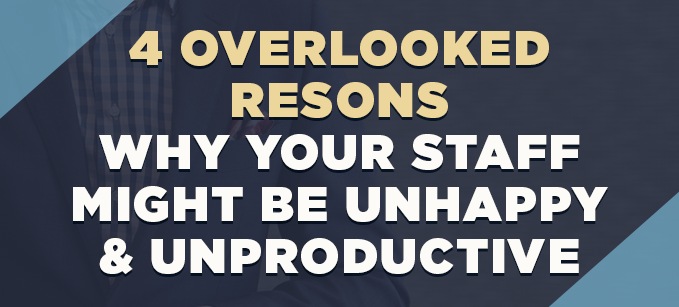4 Overlooked Reasons Why Your Staff Might Be Unhappy & Unproductive

In the past, we've written about the common drivers of employee engagement. Here we look at four of the less obvious reasons why staff might be disengaged, supported by research.
1. Open-Plan Offices
Some business owners swear by them — claiming they support collaboration, team work and innovation. However, there is mounting evidence suggesting that open plan offices make employees less productive, less happy, and more likely to get sick.
A University of Sydney study, which surveyed over 42,000 people, found the disadvantages for employees far outweigh the benefits. The report suggested that open plan offices attract the highest levels of worker dissatisfaction: “In general, open-plan layouts showed considerably higher dissatisfaction rates than enclosed office layouts,” the researchers wrote in their paper, and added: “What the data tells us is that, in terms of occupant satisfaction, the disadvantages brought by noise disruption were bigger than the predicted benefits of increased interaction."
There are several other studies that have looked at the negative effects of open-plan offices including a study in Denmark that found employees in open set-ups take 62% more sick days on average than one-occupant layouts, and Steel-case / Ipsos research of more than 10,000 workers that found office workers are losing 86 minutes a day due to distractions.
2. No Safeguards Against Stress and Burnout
It's the ever-present predicament of the modern-day worker: Too much to do and too little time to do it. Writing in the The New York Times (Why You Hate Work), Tony Schwartz and Christine Porath describe the importance of taking time for renewal in the workplace:
"Employees who take a break every 90 minutes report a 30% higher level of focus than those who take no breaks or just one during the day. They also report a nearly 50% greater capacity to think creatively and a 46% higher level of health and well-being. The more hours people work beyond 40 — and the more continuously they work — the worse they feel, and the less engaged they become. By contrast, feeling encouraged by one’s supervisor to take breaks increases by nearly 100% people’s likelihood to stay with any given company, and also doubles their sense of health and well-being."
3. Managers Over-Managing Work, Under-Managing Development
In 2009, a landmark research project was commenced by Google that sought to understand what makes an effective manager (within Google; not in general). Code-named project Oxygen, Google statisticians applied robust analytics to human resource data. More than 10,000 observations were gathered about managers, across more than 100 variables from various performance reviews, feedback surveys and other reports. The resulting manifesto was entitled 8 Habits Of Highly Effective Google Managers, which gained significant attention in the business media. Among the most important findings was the importance of developmental attitudes and behaviours in managers:
“Engineers hate being micromanaged on the technical side but love being closely managed on the career side.”
The ability of managers to assist employees with technical expertise was rated last, while what employees valued most were bosses who acted kindly, fairly, and took an interest in developing them. "Be a good coach" was listed as the #1 habit of highly effective Google managers.
4. Managers Neglecting Small, Regular Acts of Appreciation
Few bosses deliberately want to make life a living hell for their direct reports, but problems often begin to surface when people feel as though their manager is taking advantage of them or neglecting to show appreciation for the "small things." Although it might sound overstated, a small "thank you" or pat on the back (figuratively speaking, that is) can actually be more effective than cash rewards. In fact, research by McKinsey Consulting found that "some non-financial motivators are more effective than extra cash in building long-term employee engagement in most sectors, job functions, and business contexts." These non-financial motivators included things like praise from immediate managers, leadership attention (for example, one-on-one conversations), and a chance to lead projects or task forces.
With this in mind, here are a few simple things that managers can do with their teams, which cost nothing in terms of dollars, but can make a big difference in satisfaction:
- A meaningful "thank you, I really appreciate what you're doing."
- Celebrating progress and small wins
- Making sure people's opinions are heard
- Explaining why their work matters
- Complimenting people's strengths, not just their hard work when things go right
- Focusing on behaviour (not the individual) when things go wrong
- Having an "open door" policy
- Checking in regularly to ask what can be done to help
- Leaving small gifts or tokens of appreciation
Remember, it's predominately the thought that counts. An employee who feels valued and appreciated will always do more than expected.
Topics:
Employee Engagement
Theo Winter
Client Services Manager, Writer & Researcher. Theo is one of the youngest professionals in the world to earn an accreditation in TTI Success Insight's suite of psychometric assessments. For more than a decade, he worked with hundreds of HR, L&D and OD professionals and consultants to improve engagement, performance and emotional intelligence of leaders and their teams. He authored the book "40 Must-Know Business Models for People Leaders."

/Part%203%20How%20Frameworks%20Accelerate%20Diagnosis%2c%20Understanding%20and%20Mastery.png?width=374&name=Part%203%20How%20Frameworks%20Accelerate%20Diagnosis%2c%20Understanding%20and%20Mastery.png)
/Unlocking%20Career%20Potential%20Through%20Internal%20Mobility.png?width=374&name=Unlocking%20Career%20Potential%20Through%20Internal%20Mobility.png)
We Would Like to Hear From You (0 Comments)